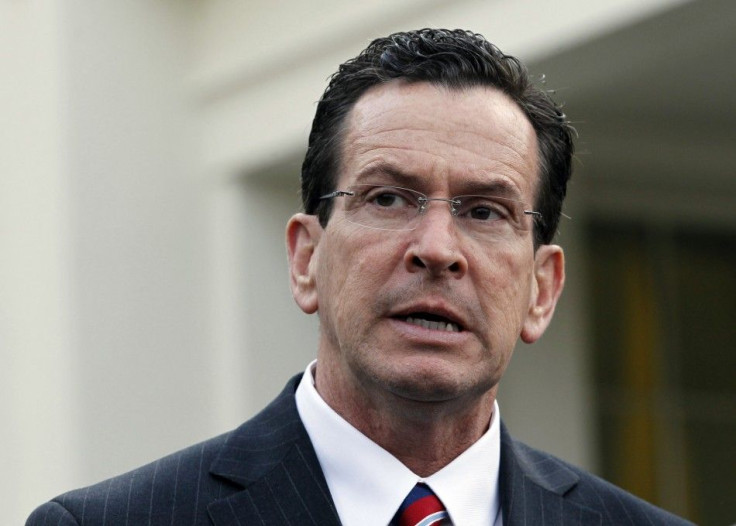Cigna-Anthem Deal: Connecticut Gov. Malloy Signs Secrecy Bill That Could Shield Insurance Information From Public Release

With his state at the center of a national review of healthcare megamergers, Connecticut Gov. Dannel Malloy quietly signed legislation that could empower state officials to conceal key documents about health insurers. The secrecy bill was attached to unrelated dental health legislation, passed by lawmakers in the middle of the night and then signed by Malloy on Friday with no public statement. The move comes days after Malloy's adminstration rejected an open records request for information about its review of Anthem's proposed acquisition of Cigna.
The new law could have national implications, because Connecticut is home to many insurance companies and is leading states’ antitrust review of the Anthem-Cigna merger. If approved by regulators, that multibillion-dollar merger would create the largest private health insurance conglomerate in American history -- one that merger opponents say could jack up premiums and reduce medical care for up to 53 million consumers across the nation. Cigna has signaled that the merger may not be complete until 2017. Connecticut’s new law formally goes into effect in October.
Following an International Business Times investigation, Malloy last week faced intensifying criticism for appointing as his state’s insurance regulator Katharine Wade — a former longtime Cigna executive who is married to a Cigna official. Amid criticism from watchdog groups who say Malloy’s administration has been overly secretive in its review of the Cigna-Anthem deal, Democratic and Republican lawmakers on Friday demanded Wade recuse herself from the merger proceedings. That same day, Malloy not only rejected such calls for recusal, he also signed the secrecy bill, which will empower Wade to withhold insurance industry-related information from the public — though which specific information remains in dispute.
Wade had championed the measure in the last legislative session and it was backed by the Connecticut Association of Health Plans — the insurance industry’s powerful lobbying group that Wade previously helped lead. The bill, which Wade said was done “in consultation” with Malloy’s office, was originally introduced in February — weeks before Cigna and Anthem pumped $360,000 of campaign cash into the Democratic Governors Association, which Malloy chairs.

The new law declares that “all workpapers, recorded information [and] documents” obtained from insurance companies by state regulators during a market conduct investigation “shall be confidential, shall not be subject to subpoena and shall not be made public.” A legislative summary says the bill authorizes regulators to obtain data about insurance companies’ market share and business operations, but that state law now “exempts data provided in response from disclosure under the Freedom of Information Act.”
According to Connecticut’s Office of the Health Care Advocate, it is the first major change to the state law governing insurance investigations in 30 years — a change that comes just as the state is playing a pivotal national role in regulating a megamerger.
In pushing the bill, Wade’s agency told lawmakers that the legislation was “of particular importance” because it will let regulators protect information that “if revealed could cause harm to the insurance company, its policyholders and its shareholders.”
The state’s healthcare advocate testified against the bill on the grounds that it would allow Connecticut officials to conceal information about insurance companies “at a time when transparency and data is more important than ever for consumers.” Though the bill appears to be limited to “data calls” about market behavior, the advocate’s office said the lack of a definition of what constitutes a data call “risks the inclusion of nearly any data that the [Insurance Department] requests from insurers in the conduct of an investigation, which is also undefined and could be very broadly applied.”
Wade said at the time that “this legislation strikes the correct balance” between transparency and privacy, and she asserted that it is “simply legally incorrect” to suggest that the bill could block the public's access to information about the state's review of mergers.
That assertion was echoed by Malloy's office: in a statement to IBT, the governor's spokesperson, Chris McClure, said the law “does not affect statutes or information gathered by the Connecticut Insurance Department related to mergers.” He also asserted that the Insurance Department had sought the legislative change since 2009, and it would “bring Connecticut in-line with 47 other states [by] protecting personal and proprietary information that would be disclosed to the agency during a market conduct examination or data call.”
Despite those reassurances, the Connecticut State Medical Society — which represents physicians — has echoed the concerns of the healthcare advocate's office, saying the law will give the Malloy administration “carte blanche authority to deem nearly any data collected in the process of a market conduct exam or inquiry exempt from FOIA disclosure.” The group has a merger-related open records request now pending with the Insurance Department.
Though the Cigna-Anthem merger has dominated Connecticut headlines for months, Malloy’s office did not issue a press release or public statement about the bill signing. The move was disclosed on Friday in a legislative update posted to the state’s website, which a source in Malloy's office said "is our standard way of announcing bill signings." According to state records reviewed by IBT, the secrecy bill originally made it to Malloy’s desk after being attached to unrelated dental legislation and was passed by lawmakers near midnight in the final moments of the 2016 legislative session.
Anthem, Cigna and the Connecticut Association of Health Plans together spent more than $213,000 on lobbying the legislature and Malloy’s administration in the roughly four months it took for the bill to be introduced and later signed into law, according to state lobbying disclosures.
Though the secrecy law was signed on Friday and does not go into effect until October, the Malloy administration has been more aggressive in blocking the release of merger-related information since the bill has passed. In April — before the bill was passed — the Connecticut Insurance Department responded to an open records act request from IBT by providing some email and documents from correspondence between state officials and Cigna and Anthem. However, after the secrecy bill passed both houses of Connecticut’s legislature in May, the agency rejected a subsequent request for other information, stating that “any documents received from Anthem or Cigna and related to the proposed merger are confidential.”
Whether or not the bill restricts the flow of information about the state's current merger review, some opponents of the transaction say they are most concerned about the legislation's implications for the future.
“The insurance department is already blocking public access to information about the proposed mergers,” said Tom Swan of the Connecticut Citizen Action Group, which has circulated a petition calling for Wade's ouster. “What concerns us about the new law is the fact that it will give the department additional tools to block the public's right to know the impact of these mergers if they are ultimately approved.”
© Copyright IBTimes 2024. All rights reserved.






















